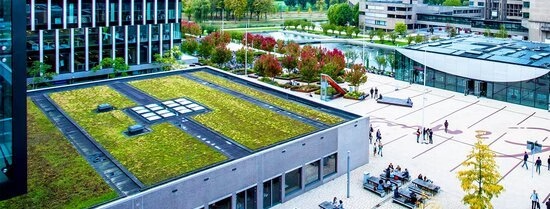Erasmus University Rotterdam (EUR) is taking the next step in its sustainability journey. Sustainability being a foundational element of the Strategy 2030, starting in September 2025, the university will voluntarily report on its environmental and social performance according to the European Union’s Corporate Sustainability Reporting Directive (CSRD). Whereas our carbon footprint assessments have been aligned with the CSRD since 2022 (as explained in EUR’s Sustainability Report 2023), the first fully CSRD-aligned report will cover our progress and activities from 2025.
What is the CSRD?
The CSRD is a European directive, adopted in 2021, that makes it easier to understand how organisations – like companies and universities – are managing topics like climate change, working conditions, diversity, and responsible business practices.
It ensures organisations publish clear, detailed, and trustworthy information about:
- Their impact on the environment and society.
- How issues like climate risks or inequality could affect their operations.
- The steps they are taking to be more sustainable.
Building on what we have already started
At EUR, we have already been reporting on sustainability and societal impact in recent years. Our ongoing efforts include sharing information on our carbon footprint, mobility, energy use, social inclusion and engagement with the Sustainable Development Goals (SDGs).

Choosing to adopt the CSRD framework builds on that foundation.
It allows us to improve the way we collect, analyse and communicate sustainability data, making it more structured and comparable. This helps us strengthen our internal decision-making, enhance transparency, and ensure we stay aligned with evolving best practices. The CSRD framework enables us to set clear, quantifiable goals on topics that are important for EUR. This provides a focused direction and measurable targets to work towards.
Supporting Strategy 2030
Being an Engaged University, leading globally and committed to the region, is the core of our Strategy 2030. We achieve this by being at the heart of society and creating a positive impact through our research, education, and engagement. Sustainability, as part of our impact mission, is a pre-requisite. Therefore, the CSRD also plays a key role in supporting the implementation of our upcoming Strategy.
As part of Strategy 2030, we are working integrally on sustainability to:
- Set clear sustainability and impact goals across the university.
- Develop frameworks to monitor progress and make data-driven decisions.
- Further integrate sustainability into our education, research and operations.
- Foster collaboration across faculties and services.
The CSRD provides the tools and structure to help us do this in a credible and coherent way.

Why is EUR choosing to follow this?
Although universities are not (yet) required to follow the CSRD, EUR is doing it voluntarily because it fits with who we are and what we stand for. Here’s why:
- We want to lead by example: As a university that values sustainability and social impact, we believe in practising what we teach and research.
- It builds trust: Students, staff, and partners deserve clear insight into how we are tackling today’s challenges, like climate change, energy use, and equal opportunity.
- It helps us improve: By collecting improved information about our impact, we can make smarter decisions, set more meaningful goals, and track our progress.
- It prepares us for the future: Public organisations may be included in these regulations soon. Starting early gives us time to learn and grow without the pressure of last-minute deadlines.
What will this look like in practice?
From 2026, EUR will publish our yearly impact & sustainability report following CSRD standards. This will help us understand how we are doing and where we can do better.
What to expect from the improved reports:
- Clear explanation of our biggest impacts: We will look at how our activities affect people and the planet, for example, through travel, buildings, and energy use, and how big global issues could impact the university in return.
- Facts: You will see improved data on topics like emissions, commuting, diversity, and more, so we can measure progress and be transparent about it.
- Stories and strategies: The report will also describe the actions we are taking, the progress made so far, and areas we are improving.
This effort will involve people and teams across the university.

What does this mean to you?
For students, this may lead to more visible and meaningful sustainability initiatives on campus and in your studies. You will also gain clearer insight into what EUR is doing to create a more sustainable and socially responsible university.
As a staff member, you may be involved in gathering data and information, and some of your work may contribute directly to the reporting process or benefit from the insights.
For our partners and community, voluntary CSRD reporting means greater transparency, accountability, and consistency, while strengthening EUR’s leadership role in shaping a better future.
Looking ahead
Voluntary compliance with the CSRD is more than just a reporting decision: it shows EUR’s long-term dedication to sustainability, accountability, and progress on societal impact. It helps us understand where we stand, where we want to go, and how we will get there.
- More information
Have a look at our page with regards to sustainability.

